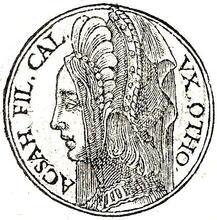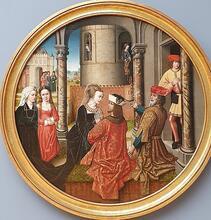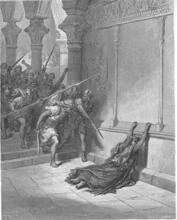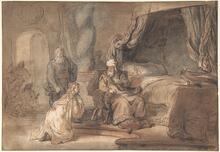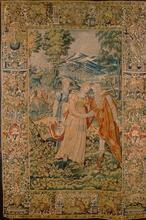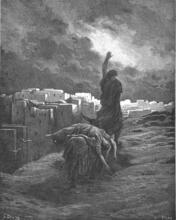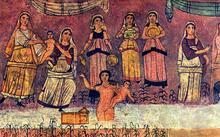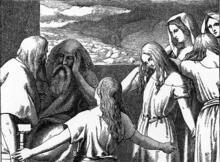Widow of Zarephath: Midrash and Aggadah
The widow of Zarephath plays a small but important role in Elijah’s story. She feeds Elijah in her home. Soon after, her son dies, and Elijah pleads to God for the power to resurrect him. The Rabbis derive from this that if someone opens his house to you, you are responsible for that person’s well-being. They further state that when Elijah revived the widow’s son, he could have resurrected his dead relatives as well. Elijah, however, was committed only to save the lives of his hosts. The Rabbis also learned that giving food to someone else is a virtue that results in the resurrection of the dead before its time: because the widow from Zarephath gave food to Elijah, she merited the reviving of her son.
Elijah in the Midrash
The A type of non-halakhic literary activitiy of the Rabbis for interpreting non-legal material according to special principles of interpretation (hermeneutical rules).midrash explains why Elijah stopped the rains and how it happened that he was commanded to go to the home of the woman in Zarephath. Elijah and Ahab had met when they came to console Hiel the Bethelite, who was in mourning. Hiel had transgressed Joshua’s prohibition against rebuilding Jericho (Josh. 6:26), and the resulting curse cost him the lives of his sons: “He laid its foundations at the cost of Abiram his firstborn, and set its gates at the cost of Segub his youngest” (I Kings 16:34). In their meeting in the mourner’s house, Ahab asked Elijah: “The curse of Joshua is fulfilled, but the curse of Moses is not? Moses had said: ‘Take care not to be lured away to serve other gods […] For the Lord’s anger will flare up against you, and He will shut up the skies so that there will be no rain’ [Deut. 11:16–17]. And here, I erect idols on every ridge in the land, and the rains fall so copiously that it is impossible to walk to those ridges. The curse of the teacher is not fulfilled, but that of his disciple is?!” With this question Ahab sought to deny the Divine system of reward and punishment that Elijah represented. The prophet immediately responded to the king: “As the Lord lives, the God of Israel […] there will be no dew or rain except at my bidding” (I Kings 17:1). Elijah prayed and from heaven he was given the key of rain, so that it would descend only at his command. Elijah arose and went to Wadi Cherith, where the ravens brought him bread and meat (v. 2). From where did the ravens bring meat? From Ahab’s slaughterhouse. When God saw that there was suffering in the world but Elijah was unaware of it, He told him to go to Zarephath, the widow (BT Sanhedrin 113a). This exegesis is based on the juxtaposition between the episode of Hiel the Bethelite (I Kings, end of chap. 16) and the drought (beginning of chap. 17). Elijah’s stay in the house of the widow was meant to bring him closer to the suffering prevalent in the world, and to acquaint him with the hunger and want from which the women and children suffered.
Elijah is commanded to go to Sidon, where he will be fed by a widow (17:9). The Rabbis applied to this the verse (Ps. 37:25): “I have been young and am now old, but I have never seen a righteous man abandoned, or his children seeking bread.” God does not abandon the righteous or their children in time of famine, and if drought comes to the world, He arranges sustenance for them. This can be learned from Elijah, for whom God provided, as it is said (I Kings 17:9): “I have designated a widow there to feed you” (Tanhuma, Mikez 6).
Another tradition reveals Elijah’s dislike of having to rely on other people. He would even take oil-lamps and wicks with him when he went from place to place, so as not to trouble others. The same held true for food: when he came to the widow’s house, “she and he ate from his” [that is, both the widow of Zarephath and Elijah partook of Elijah’s food, which was miraculously provided to sustain him in the widow’s house]. This is why the ketiv [the Scriptural text as written, in v. 15] has “he and she had food,” while the keri [the traditional reading] has “she and he had food.” The Rabbis ask why, then, does God say: “I have designated a widow there to feed you”—did he eat from her food? Rather, because she received him hospitably and attended to him, this hospitality is ascribed to her, and she also merited having Elijah revive her son (Cant. Rabbah 2:5:3).
A Woman of Valor
The Rabbis applied to this woman the verse from the Eshet Hayil (“Woman of Valor”) passage (Prov. 31:20): “her hands are stretched out to the needy,” since she fed Elijah (Midrash Eshet Hayil, Batei Midrashot, vol. 2). Elijah’s receiving food from a widow creates a parallelism with Moses, the father of all prophets. Moses, too, received his food from a woman, when Jethro sent his daughters to bring him from the well (Ex. 2:20): “Ask him in to break bread” (Pesikta Rabbati chap. 4). Elijah orders the woman to prepare “a small cake” for him (v. 13). The Rabbis expound that the cake that the widow made for Elijah was similar to mazzah (unleavened bread) and to the mazzah cakes eaten by the Israelites when they departed from Egypt. These mazzah cakes miraculously sufficed for the Israelites for thirty days, until the manna began to descend (Mekhilta de-Rabbi Ishmael, Masekhta de-Pis’ha, Bo 14). The midrash apparently understands that the food eaten by Elijah during his stay with the widow was of miraculous origin, since the entire land was suffering from a severe drought.
While in the widow’s house, Elijah performs the miracle of the jar of flour and the jug of oil, to which, according to the Rabbis, Prov. 10:22 refers: “It is the blessing of the Lord that enriches.” A single spoonful of ground flour that the woman had and the little oil in the jug sufficed, they were not exhausted, and the blessing reigned from within her home (Tanhuma, Ki Tisa 29).
Death and Resurrection
After this, the woman’s son falls ill and dies (v. 17). The Rabbis relate that this son was Jonah son of Amittai, who was completely righteous, and would eventually enter the Garden of Eden while still alive (Midrash Tehilim 26:7). The woman said to Elijah (v. 18): “[…] that you should come here to recall my sin and cause the death of my son?” In the midrashic expansion, she tells him: Until you came here, God would weigh my actions in comparison with the local people, and I would be found worthy. Now that you, who are righteous, have come to me, God weighs my actions in comparison with yours, and so you have recalled my sins, and [consequently] my son died” (Pesikta Rabbati chap. 3). Elijah began to entreat God, and said (v. 20): “Will You bring calamity upon this widow whose guest I am, and let her son die?” The Rabbis derive from this that if someone opens his house to you, you are responsible for that person’s well-being. They further state that when Elijah revived the widow’s son, he could have resurrected his dead relatives, as well. Elijah, however, was committed only to save the lives of his hosts (Ex. Rabbah 4:2).
Elijah prayed that God give him the key of the resurrection of the dead, but he was told from Heaven: “Three keys were not entrusted to an agent [i.e., an agent responsible for them], but remained with God, namely: the key of the woman giving birth, the key of rain and the key of the resurrection of the dead. You already have the key of rain, and you [also] want the key of the resurrection of the dead? It will be said that two keys are held by the disciple and one by the Master! Give back the key of rain, and take the key of the resurrection of the dead.” Accordingly, after Elijah revived the widow’s son, the Biblical text states (I Kings 18:1): “Go, appear before Ahab; then I will send rain,” because he had to return the key of rain and stop the drought (BT Sanhedrin 113a). This exposition, based on the juxtaposition of the resurrection of the widow’s son (end of chap. 17) and God’s command to stop the drought (beginning of chap. 18), creates a causal relationship between them. This midrash seemingly comes to somewhat moderate Elijah’s powers as they are presented in the Biblical narrative, since he does not control everything, but receives only one key at a time. The midrash thus draws a parallel between the death of the widow’s son, on the one hand, and the drought and the resulting famine on the other. Elijah undergoes a process of change: the death of the son enables him to understand God’s suffering at the sight of His starving handiwork and he is therefore willing to return the key of rain.
The reviving of the dead in this narrative serves the Rabbis as a model of the future Resurrection of the Dead, since whatever God will do in the World to Come He has already shown to humans in this world. The fact that God resurrects the dead was already shown by Elijah, Elisha and Ezekiel (Lev. Rabbah 27:4). Another Rabbinic teaching states: If someone tells you that God does not resurrect the dead, say to him: Elijah the Gileadite attests that God resurrects the dead (Deut. Rabbah [ed. Lieberman], Ekev, p. 74). The Rabbis also learned from this episode that giving food to someone else is a great virtue that results in the resurrection of the dead before its time: because the widow from Zarephath gave food to Elijah, she merited the reviving of her son (Cant. Rabbah 2:5:3).

